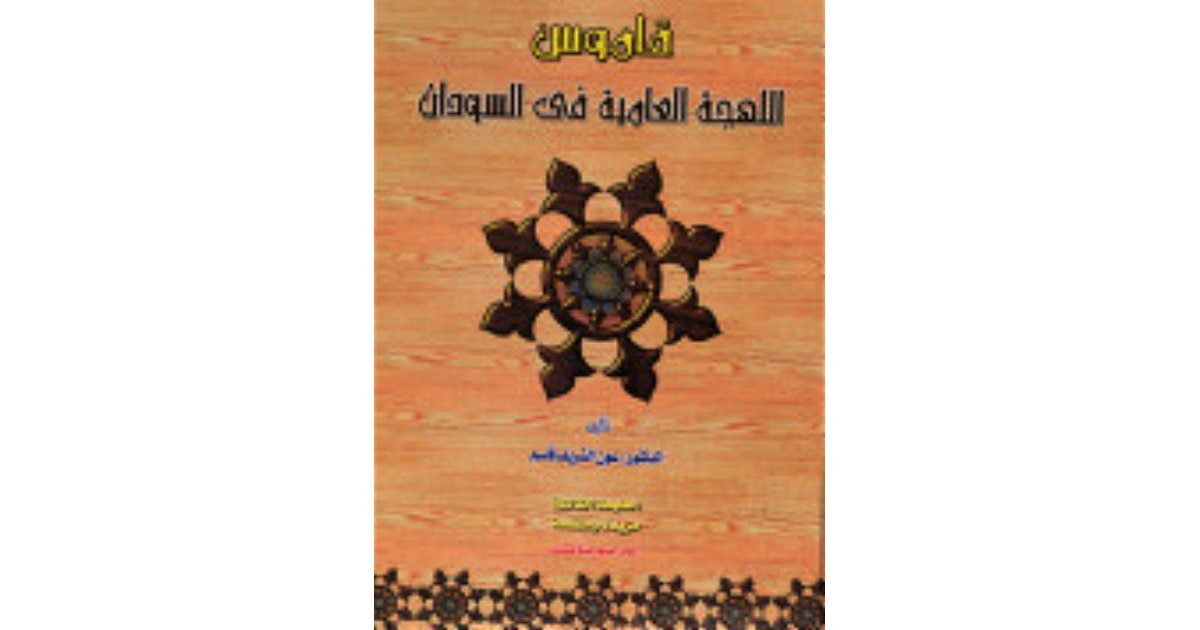Influence Of Turkish On The Sudanese Vernacular
24 December, 2017
Prof Gasim's book on Sudanese vernacular
KHARTOUM (Sudanow) - A language that does not borrow from others is a dead language. A language like English, is over 60% borrowed from other languages. You could see that even in the Koran, the most eloquent of all texts in which Arabic language is used, has words borrowed from other languages. It was through studying these terms that men of literature could understand reference made therein. Studying words and their ancestral belonging helps deciphering work of arts.
The argument here is that word, and words, are very vital in each literary work, by studying words and their relations to our society, we could better understand our history, our literary work and even our thinking. And it is within this context that we are going through this interesting citation of Turkish words in Sudanese society. It is not history, it is life riffraffing in our streets and ranks and files.
Turkish rulers of Egypt had ruled Sudan for over sixty years (1821-1885) during which a number of Turkish words had entered into the Sudanese vernacular, in particular in the administration, the military and in some food items and instruments.
Quoting outstanding linguists like Sudanese Professor Awn al-ShareefGasim and Lebanese writer JurjiZaydan, critic and researcher AbdelmoneimAajab al-Fayya says that any word in the Sudanese language that begins with or contains the syllable /bash/ is sure of Turkish origin.
The list contains, for instance, the words bashkatib (chief clerk), hakeembashi (chief medical doctor) and bashmuhandis (chief engineer). Bash or basha in Turkish means big or chief.
And every utterance ending with /khanah/ is either of Turkish or Persian origin. The list contains shafakhana (the place where one is cured from a disease i.e hospital or clinic). We also have ajzakhanah, which is the place where you get medicine (i.e pharmacy). There is also the word adbakhanah (the polite word for W.C or lavatory). Adab means politeness and khana is place. So the term W.C is tabooed into the place for politeness (adabkhana).
Then we have the syllable /dar/ which we can see in the words hikimdar (police unit commander or, simply, ruler), brigdar (brigadier) and Sirdar (chief confidante) in the royal circles.
The syllable /je/ at the end of some words like tamarje (nurse), makhzanje (storekeeper), khudurje (vegetable vendor), la’abanje (literally playful or wayward) and sukurje (an alcoholic) is part of the Turkish language that has also become part of the Sudanese language.
In addition, we find some words that have been borrowed whole from Turkish. For example we have the words afarim (excellent), doghree (straightforward), Oadah (room), bardo (also) dushman (war or fighting). Also we find the word kahrabah (electricity), which George Zaidan said is originally a Persian word that has become part of Turkish and then became part of the Sudanese lexicon.
We also have the word saray or saraya, which means palace. We say the governor-general’s Saraya.
Then the words urta (which means army), urnaik (which means form), taboor (which means a column of soldiers), sanjak (flag or banner), sirb (drove or group of flying planes) and firgah (army division), according to George Zaidan. The term Ameeralaay means division commander.
In food terminology we have basturmah (sliced lean meat), kufta (minced lean meat), gawormah (boiled onions or onion soup), turshi (fermented milk), basboosa( a sort of candy) and others.
These Turkish or Persian words continued to be used in the Sudan until after the end of Turkish rule in 1885 by the triumph of the Mahdist Revolution. They also continued to be used during the Anglo-Egyptian rule (1900-1956) and after.
Yet some of these words had started to diminish due to the Arabization of terminology in the military and the civil service at the beginning of the rule of Sudan’s former strongman Ja’afarNimeri (1969-1985). The trend gathered more steam by the coming to power of the Sudanese Islamists (1989), in what came to be known as ta’aseel (orignalization).
But the words of general nature like doghree, bardo and oadah, the words that end with the syllable /je/ and the words urnaik, ajzakhanah and adabkanah continued in use. The term karakoan (police station) has escaped the military’s axe. The words baghah (plastic can), bakht (luck), bas (shut up) and dandormah (soft ice cream), all of Turkish origin, are still used. The word ajzakhanah (pharmacy) was eclipsed by the Arabic word saydaliyyah. The word adabkhanah (W.C) has diminished or is about to give way to the Arabic word hammam (bathroom).
Researcher Fayya considers it suitable for some of these Turkish terms (like hakeembashi, Shifakhanah and Ajzakhanah) to continue in use because they are, whatever their origin, are “not just words”. “They are part of the memory of the nation and a storehouse of the nation’s history.”
“Whether such words should remain or fade away should be subject of natural selection and should not be estranged on ideological basis that may frustrate people and restrain the language’s wideness and linguistic and cultural diversity,” Fayya argues.
A Turkish language section was launched in the Holy Qoran and Islamic Sciences University here in 2012 with financial support from the Turkish coordination and cooperation agency (TIKA). It is run by teachers from the YounisEmrrah Institute in Turkey. The section graduated its first batch last year. In 2017 the section enrolled 400 students, 250 females and 150 males. In addition to Turkish, the students learn the interpretation of the Koran, Prophet Mohammad’s tradition and other Islamic studies.
The students use the University’s Sultan Ali Dinar’s library which was equipped with Turkish books. They also watch Turkish films.
All members of the first batch have now been employed whether in government bodies or in TIKA that runs a lot of projects around the Sudan.
E N D
YH/MO








